ENACT Research
The Impact of ENACT Courses
Transformations Through Civic Engagement, Volume 3 (2025)
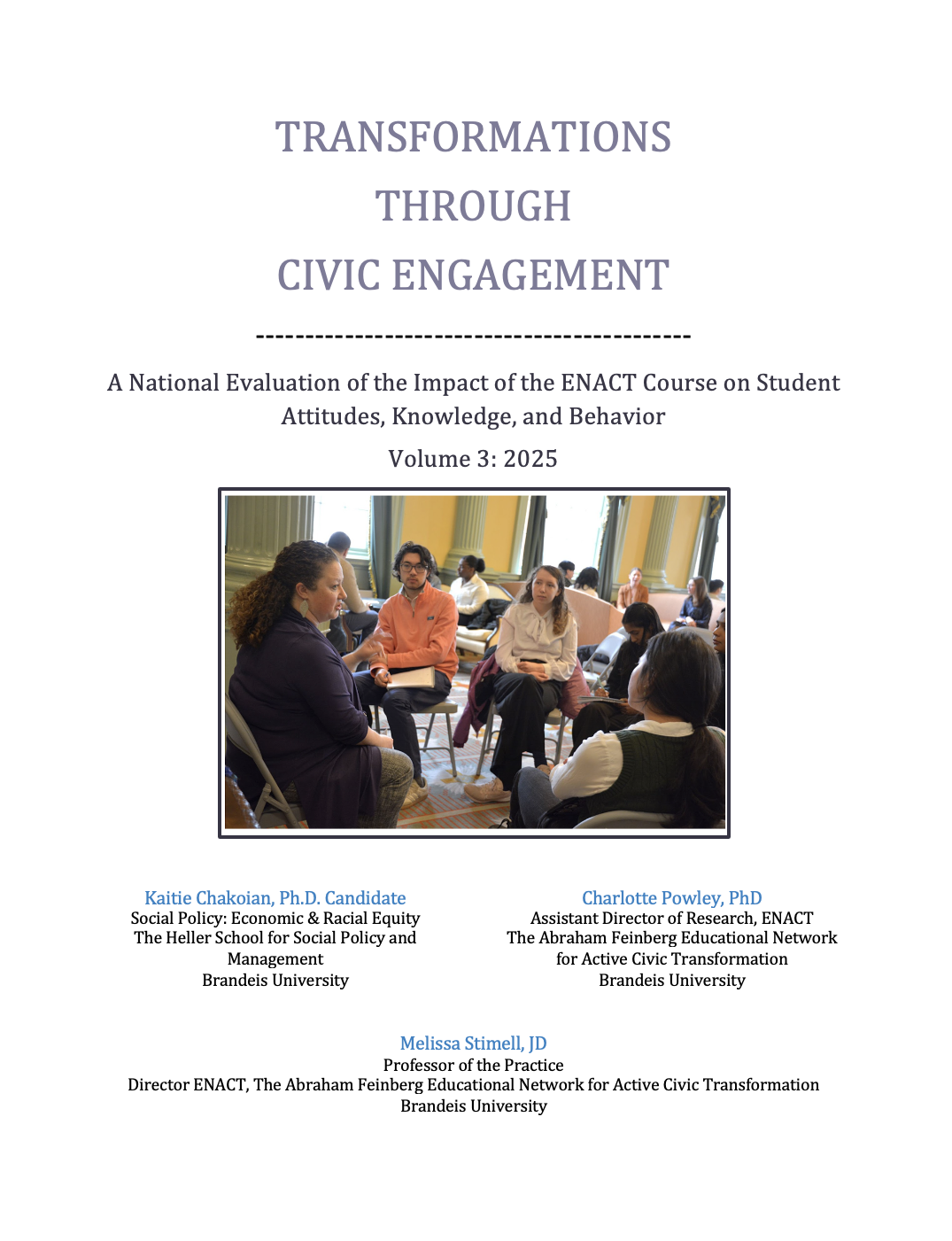
Volume Three of “Transformations Through Civic Engagement: A National Evaluation of the Impact of the ENACT Course on Student Attitudes, Knowledge, and Behavior," is based on surveys ENACT students nationwide took at the end of the fall 2024 and spring 2025 semesters.
Key findings:
- Consistent with findings from previous iterations of the ENACT National Survey, students who complete an ENACT course report high levels of political knowledge, new critical skills for political engagement, and feelings of efficacy that they can have an impact on government and politics.
- These findings around knowledge, skills, and attitudes translate to levels of political engagement that are above national averages for comparable groups.
- Participants in the current year’s survey vote at national, state, and local levels at higher rates than in previous years and at levels that far surpass national comparison rates.
- ENACT students are interested in having an impact on politics and government. In the ENACT courses they gain knowledge and skills to engage civically and politically which build their sense of efficacy and translates to behaviors, both in and out of the voting booth.
See the accompanying PowerPoint slides here.
Transformations Through Civic Engagement, Volume 2 (2024)
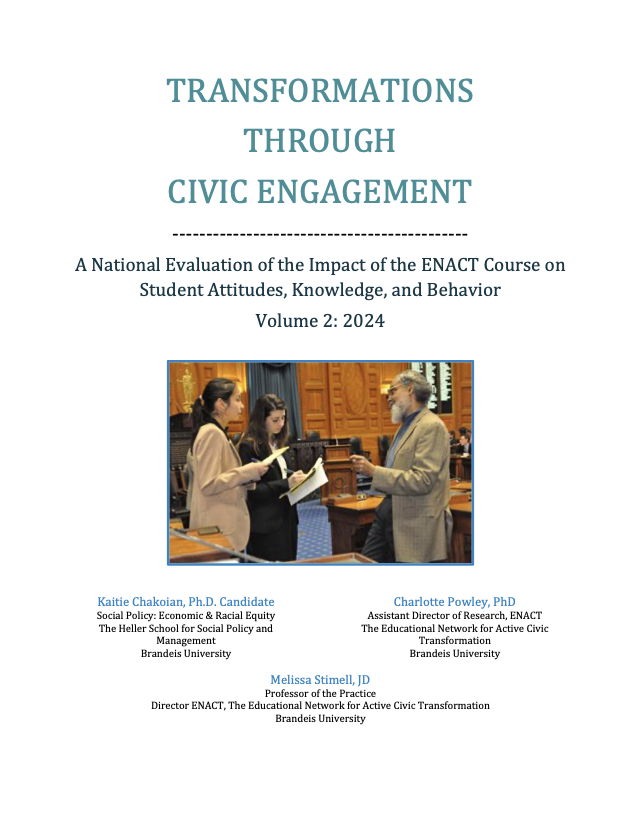 Volume Two of “Transformations Through Civic Engagement: A National Evaluation of theImpact of the ENACT Course on Student Attitudes, Knowledge, and Behavior” (2024) describes the impact of ENACT courses on student attitudes, knowledge, and behavior.
Volume Two of “Transformations Through Civic Engagement: A National Evaluation of theImpact of the ENACT Course on Student Attitudes, Knowledge, and Behavior” (2024) describes the impact of ENACT courses on student attitudes, knowledge, and behavior.
The report is derived from survey data from students who participated in ENACT courses from fall 2023 through spring 2024 (a total of 101 participants). The survey consists of the following sections: 1) Engagement, 2) Knowledge, 3) Efficacy, 4) Civic Action, 5) Voting Behavior, 6) Tolerance/Diversity, 7) Skills/Competencies, 8) College Experience, 9) Values, 10) Demographic questions.
Students who complete an ENACT course express having strong political efficacy. For example, 90% of survey respondents indicated that they know enough to participate in politics while over three-quarters believe they can personally influence politics or policy in their communities or states. An even higher percentage, 77%, feel they could do as good a job in public office as most other people, and 79% indicated that they think they are better informed about politics and government than most people.
Students who complete an ENACT course are also engaged in social, civic, and political activity. Students who completed the survey shared that within the past 12 months, 73% attended meetings related to politics and 72% signed a petition. In addition to impacting students' political efficacy and engagement, ENACT courses help students develop critical and translatable professional skills. For example, participants reflected that their ENACT coursework contributed to their communication skills, with a majority of respondents (79%) indicating that the course helped to improve their writing skills and 75% reported that the course enhanced their ability to speak clearly and effectively.
Transformations Through Civic Engagement, Volume 1 (2023)
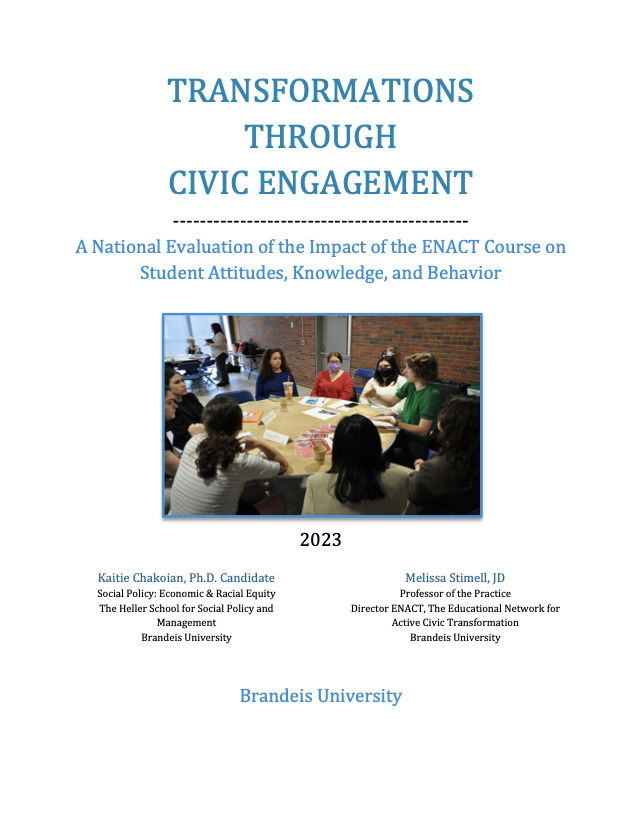 Volume One of “Transformations Through Civic Engagement” describes the results of theENACT National Evaluation Survey, which asks about students’ attitudes, knowledge, and behavior around civic engagement, as well as their perceptions of the impact the ENACT course had on them. This report is based on survey data collected from students who participated in ENACT courses between January 2022 and May 2023 (a total of 143 participants).
Volume One of “Transformations Through Civic Engagement” describes the results of theENACT National Evaluation Survey, which asks about students’ attitudes, knowledge, and behavior around civic engagement, as well as their perceptions of the impact the ENACT course had on them. This report is based on survey data collected from students who participated in ENACT courses between January 2022 and May 2023 (a total of 143 participants).
The ENACT National Evaluation Survey revealed that ENACT alumni are confident in their political efficacy. Respondents indicated that they think they are better informed about politics and government than most people (84%), and feel they could do as good a job in public office as most other people (75%). The majority are interested in politics (86%) and consider themselves to be politically active (72%). Over three-quarters of participating ENACT students believe that they personally can influence politics or policy in their communities and states.
Survey participants credited the ENACT course with building skills that hold value in their professional careers. Over 83% believe that the ENACT course contributed to their skill in working with others. 79% indicated that the ENACT course helped develop their writing skills and 76% believe it helped develop their ability to speak clearly and effectively.
Transforming the Civic Engagement of Future Generations (2022)
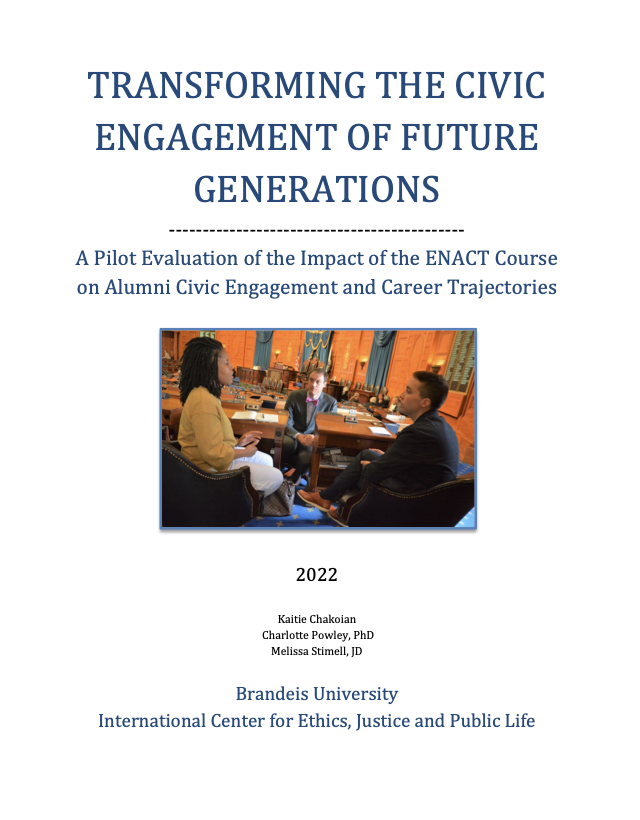
For “Transforming the Civic Engagement of Future Generations: A Pilot Evaluation of theImpact of the ENACT Course on Alumni Civic Engagement and Career Trajectories” (2022) ENACT Director Melissa Stimell, with then Brandeis graduate student Kaitie Chakoian and ENACT Assistant Director of Research Charlotte Powley, PhD, surveyed and interviewed alumni from 10 years of the Brandeis ENACT Advocacy for Policy Change course (LGLS 161b), which was developed by Stimell and has been taught by her since 2011.
This course is the model for the Ethics Center’s national, 50-state program ENACT: The Educational Network for Active Civic Transformation.
The results from this ENACT Pilot Evaluation Report shows the impact of Ethics Center’s ENACT course on alumni civic engagement and career trajectories.
Among the conclusions:
ENACT alumni have high levels of political efficacy. They feel well-qualified to engage with the political process and believe that doing so can have an impact on political outcomes. As a result, they are much more civically engaged than the average U.S. resident. They vote at substantially higher rates and engage in various other ways. ENACT alumni retain the knowledge they learned in the class about the political process, even years after completing it. They also retain skills (speaking and writing clearly, working effectively with others, and evaluating data sources) that have helped them in their professional work — whether that work is policy-related or completely unrelated. In addition to these skills, ENACT alumni credit the networks they developed and the mentorship of ENACT faculty with the trajectories their careers have taken since leaving Brandeis.
The Impact of ENACT Internships and Fellowships
Research and Advocacy Fellows 2024-2025 Report
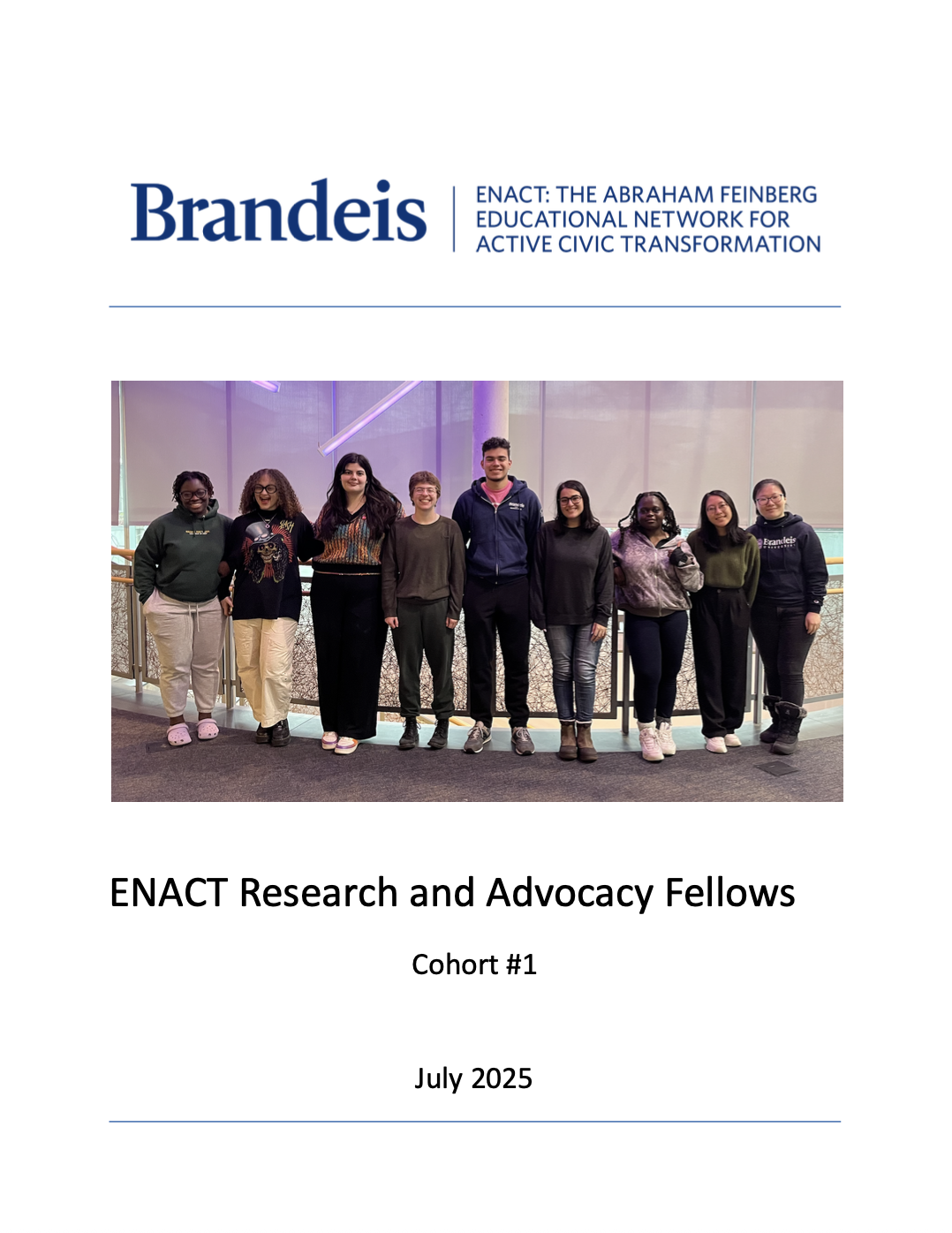
The ENACT Research and Advocacy Fellowship welcomed its inaugural cohort during the 2024-2025 academic year. Fellows conducted original research under the mentorship of ENACT Assistant Director of Research, Charlotte Powley, in the fall of 2024 and implemented a change project on campus linked to their research findings in the spring of 2025. The Fellowship is an innovative initiative designed to actively involve students in research and advocacy.
Fellows conducted an original survey of their Brandeis peers in the fall of 2024, in an effort to assess the current state of menstrual equity on campus. During the spring 2025 semester, the Fellows hosted events, presented their research findings to student groups, faculty and staff members, and others in leadership in order to enact data driven change on campus. For example, students hosted events such as “Menstrual Equity Trivia Night,” a “Period Product Packaging Pizza Party,” a screening of the 2023 film “Periodical,” screening of the 2018 documentary short “Period. End of Sentence”, and a “Menstrual Equity Panel” featuring industry experts and Massachusetts State Representative Natalie Blais.
Fellows completed both a pre and post survey regarding their Fellowship experience and the skills that they acquired. Key findings include:
- Fellows reported high levels of understanding of how a research study is conducted.
- Fellows grew in their understanding of the importance of ethical guidelines in research.
- 100% of Fellows expressed high levels of confidence in their ability to collect, analyze, and describe both qualitative and quantitative data by the end of the Fellowship experience.
- Fellows articulated an overall growth of their civic engagement skills and expertise with the democratic process.
In reflecting on their experience, one ENACT Research and Advocacy Fellow shared, “Being an ENACT Fellow has been one of the most transformative experiences of my college journey. It gave me the opportunity not only to learn how policy is made but to actively take part in shaping it. The biggest lesson I’ve taken away from this program is that my voice has power. Before joining ENACT, I often felt like change was something only lawmakers or people with high-level connections could create. I didn’t realize how much potential I had to be part of the process. ENACT taught me that change begins with the people who care enough to speak up.”
See the accompanying PowerPoint slides here.
ENACT Corps 2025 Report
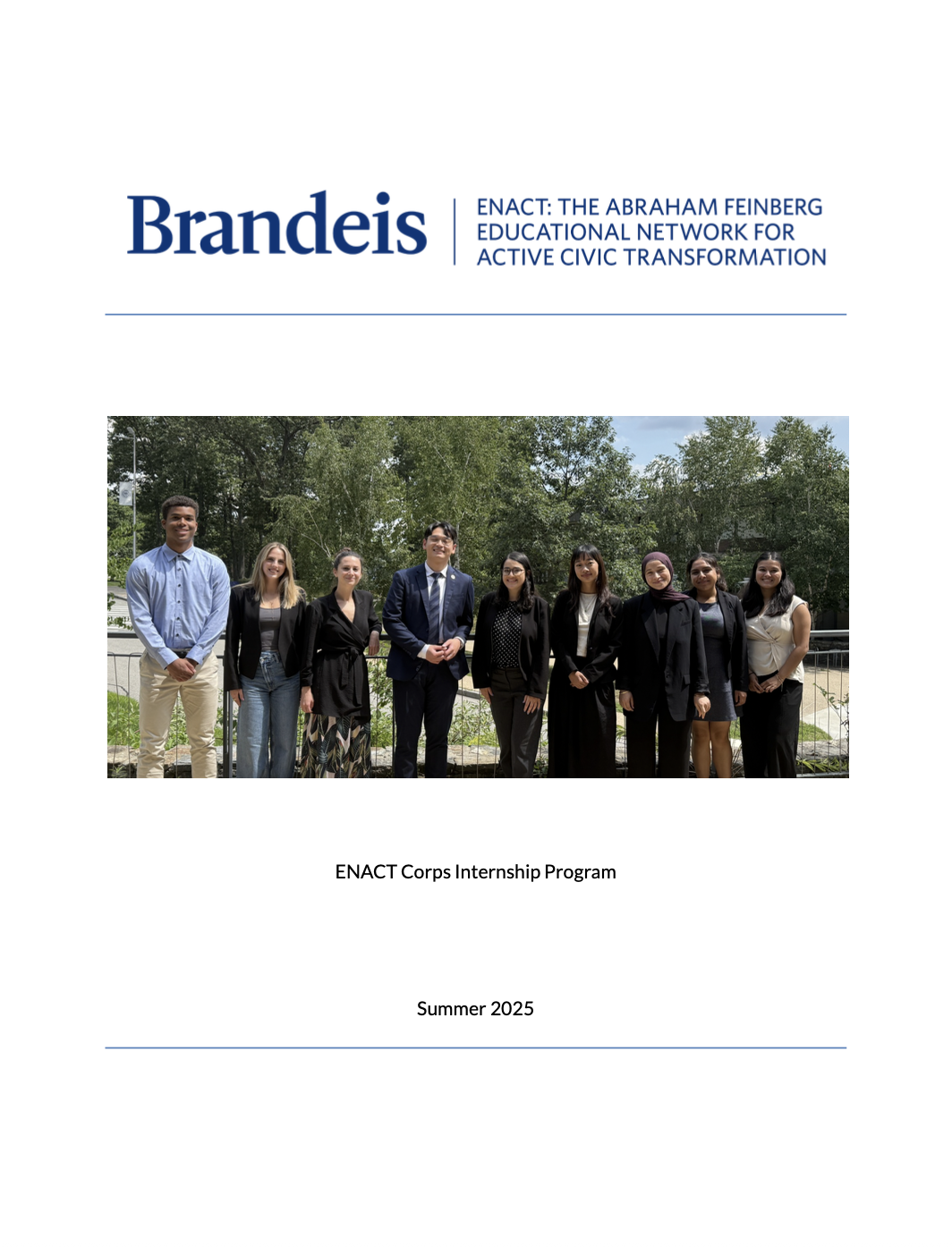
The ENACT Corps is a summer internship-based program that offers Brandeis undergraduate students an opportunity to gain hands-on work experience in the following areas: 1) research, 2) advocacy, and 3) policy. Eight Brandeis undergraduate students were selected as the inaugural cohort for the ENACT Corps Summer 2025 Internship Program. Summer 2025 employers included 1) the Office of Massachusetts State Representative Sam Montano, 2) the Office of Massachusetts State Senator Barry Finegold, 3) the Massachusetts State Auditor’s Office, 4) the Massachusetts Women’s Political Caucus, 5) the Office of Massachusetts State Representative Steven Owens, 6) Our Bodies Ourselves (OBOS) (hosted two students), and 7) Partners in Justice (Ramirez & Sunnerberg LLC).
ENACT Assistant Director of Research, Charlotte Powley, served as a mentor for students alongside their internship site supervisor. Throughout the eight week internship experience, the ENACT Corps interns attended regular two hour ENACT workshops on Friday afternoons with their fellow interns. These sessions provided students with an opportunity to 1) connect with each other as a cohort, 2) debrief on their experiences from that week, 3) troubleshoot any challenges or concerns they may have had, and 4) explore critical career development subjects.
Interns completed a pre and post survey which consisted of both quantitative and qualitative questions. The data demonstrates a level of overall satisfaction with the support and mentorship throughout the program. Neema Kintonga (Class of 2027), who interned at OBOS, shared her reflections on the ENACT Corps experience stating, “This experience has helped shape how I see the world, how I approach my work, and what kind of legal advocate I want to become. It has been both grounding and inspiring, and I’m deeply grateful to have been part of the ENACT Corps this summer.”
ENACT Corps employers were also given an opportunity to provide feedback. They completed both a midsummer survey and an end of summer survey. 100% of employers said that they would recommend their ENACT intern for future employment. One employer noted, “We are so grateful to have been a part of the ENACT internship program. We loved working with our students and are very happy with the work they produced.” Furthermore, one ENACT employer shared their appreciation of the ENACT intern’s work, particularly as they embarked upon new and meaningful projects for the organization: "These are real projects without precedent in our organization... The [ENACT Corps intern] has been really great."